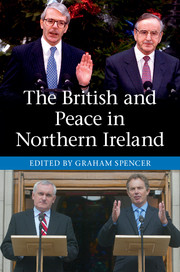Book contents
- Frontmatter
- Dedication
- Contents
- Notes on contributors
- Acknowledgements
- Brief chronology of the peace process
- Abbreviations
- Key documents
- Introduction
- 1 The terrain of discourse
- 2 The Anglo-Irish Agreement: an interview with Sir David Goodall and Lord Armstrong of Ilminster
- 3 The constitutional issue in Irish politics
- 4 Negotiations and positions: an interview with Sir John Chilcot
- 5 Resolving intercommunal conflict: some enabling factors
- 6 Tactics, strategy and space
- 7 The Joint Declaration and memory
- 8 Movement and transition in 1997: Major to Blair
- 9 The challenge of symmetry in dialogue: an interview with Sir Joseph Pilling
- 10 Why was the Good Friday Agreement so hard to implement?: lessons from ‘Groundhog Day’, 1998–2002
- 11 Text and context: an interview with William Fittall
- 12 The nature of dialogue: an interview with Sir Jonathan Phillips
- 13 Managing the tensions of difference: an interview with Jonathan Powell
- Conclusion
- Index
4 - Negotiations and positions: an interview with Sir John Chilcot
Published online by Cambridge University Press: 05 March 2015
- Frontmatter
- Dedication
- Contents
- Notes on contributors
- Acknowledgements
- Brief chronology of the peace process
- Abbreviations
- Key documents
- Introduction
- 1 The terrain of discourse
- 2 The Anglo-Irish Agreement: an interview with Sir David Goodall and Lord Armstrong of Ilminster
- 3 The constitutional issue in Irish politics
- 4 Negotiations and positions: an interview with Sir John Chilcot
- 5 Resolving intercommunal conflict: some enabling factors
- 6 Tactics, strategy and space
- 7 The Joint Declaration and memory
- 8 Movement and transition in 1997: Major to Blair
- 9 The challenge of symmetry in dialogue: an interview with Sir Joseph Pilling
- 10 Why was the Good Friday Agreement so hard to implement?: lessons from ‘Groundhog Day’, 1998–2002
- 11 Text and context: an interview with William Fittall
- 12 The nature of dialogue: an interview with Sir Jonathan Phillips
- 13 Managing the tensions of difference: an interview with Jonathan Powell
- Conclusion
- Index
Summary
Interview
GS: What did your job involve?
JC: I started work in Northern Ireland in the mid-1960s as a young official in the Home Office. Roy Jenkins was Home Secretary and I was his junior private secretary, and I was involved in Northern Ireland from there. By about 1967 things began to change significantly. I was called back at very short notice by Jim Callaghan, who had succeeded Roy after devaluation at the Treasury. He said he wanted contingency plans drawn up in a hurry for Northern Ireland just in case we had to intervene, and he courageously went there to face the situation and that left a very deep mark on me. I did not go back to the subject matter of Northern Ireland until 1990, but I spent a lot of years in between dealing with areas such as policing and security, and was very alert to the terrorist dimension. I followed at a distance what was going on with Willie Whitelaw and then Merlyn Rees, and in 1977–8 I became Merlyn Rees’ principal private secretary when he was home secretary. Despite Roy Mason's secretaryship in Northern Ireland, where nothing shifted, or was not allowed to be seen to shift, I got more and more personally interested in the problem and when I was offered the job of permanent secretary in 1990, I jumped at it. On my very first night I was woken in the small hours with the news that a series of proxy bombs had killed a number of soldiers, and had to deal with the dilemma of whether to stay there or go back to London to handle the political flak from Parliament. So it was a baptism of fire in that sense. It was also apparent to me then that leadership in symbolic terms was very important when it came to Northern Ireland and how to respond to what was going on there.
- Type
- Chapter
- Information
- The British and Peace in Northern IrelandThe Process and Practice of Reaching Agreement, pp. 79 - 100Publisher: Cambridge University PressPrint publication year: 2015



